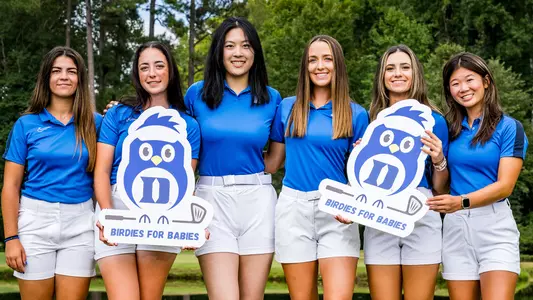At Duke University, success on the golf course often speaks for itself. But this spring, it’s what happened off the course that has captured the hearts of many in Durham and beyond. The Duke men’s and women’s golf teams have combined their talents, passion, and a whole lot of birdies to raise $9,525.10 for a cause bigger than sports: supporting premature babies and their families through the Birdies for Babies initiative. And according to those involved, they’re just getting started.
Launched as part of a broader movement within college golf, Birdies for Babies challenges teams and individual players to raise funds based on performance—specifically, the number of birdies made during competition. Each birdie becomes more than just a mark on a scorecard; it transforms into a tangible act of generosity, offering hope to newborns in neonatal intensive care units and their families.
For both the Duke men’s and women’s teams, this initiative quickly became about more than numbers. It became personal.
“The idea of Birdies for Babies really resonated with all of us,” said women’s head coach Dan Brooks, who has been at the helm of the program for decades and is the winningest coach in NCAA women’s golf history. “When you compete at this level, there’s an awareness that we’re incredibly fortunate. This was a way to give back that felt meaningful and tied directly to the sport we love.”
The Duke men’s team, led by head coach Jamie Green, echoed that sentiment. “We talk a lot about playing for something greater than ourselves. Birdies for Babies gave us a real chance to do that. Every birdie became an opportunity to help a family in need, and that gave our players a deeper sense of purpose.”
With each tournament, the cause grew closer to the hearts of the players. Both teams began tracking birdies not just as part of their performance goals, but as contributions to the broader mission. Some players even encouraged family members and friends to pledge donations per birdie, turning rounds of golf into mini fundraisers.
Junior women’s standout Phoebe Brinker, a vocal advocate for social impact through sports, was among the most active participants. “We talk a lot about team culture and accountability,” she said. “This was one of those things that brought our team together in a really special way. It wasn’t about who played the best—it was about how we could all contribute to something that truly mattered.”
The same could be said on the men’s side, where sophomore Jimmy Zheng helped spearhead internal team efforts to boost awareness and participation. “There’s something really powerful about knowing that your performance can help save lives,” Zheng said. “Golf can be such an individual sport sometimes, but this made it feel so much more connected.”
As of early May, the combined total of $9,525.10 stands as a testament to Duke’s commitment—not only to excellence in athletics, but to service and humanity. According to team officials, the effort isn’t just a one-off initiative. The plan is to continue fundraising throughout the season and to potentially grow the initiative into a year-round effort involving alumni and community partners.
“This is not the end,” said Coach Green. “We’ve built momentum, and our student-athletes are already talking about ways to carry this into the summer and beyond. Whether it’s summer tournaments, alumni matches, or special fundraising drives, we believe this can become a long-standing tradition at Duke Golf.”
In addition to its financial impact, the initiative has offered players perspective—a rare commodity in the high-pressure world of collegiate athletics. Competing for conference titles and NCAA championships comes with immense stress and scrutiny, but Birdies for Babies reminded players of the bigger picture.
“When you’re walking up the 18th fairway with a chance to close out a round, sometimes the nerves hit hard,” said women’s senior Andie Smith. “But I found that thinking about why we were doing this—who we were doing it for—helped calm me down. It turned pressure into purpose.”
That purpose has also resonated with the Duke golf community at large. Parents, boosters, and former players have voiced overwhelming support for the initiative, some making independent contributions or pledging matches to the teams’ birdie counts.
Director of Athletics Nina King praised the dual-team effort as a reflection of Duke’s broader commitment to service and leadership. “Our student-athletes are some of the most driven individuals you’ll ever meet,” King said. “But what makes Duke special is how they consistently use that drive to lift others up. Birdies for Babies is a perfect example of that spirit.”
Even the national golf community has taken notice. Coaches from other Power Five schools have reached out to Duke staff to learn more about how to start similar campaigns within their own programs. What began as a simple idea has blossomed into a movement, with Duke playing a key role in leading the charge.
That leadership is nothing new for the Blue Devils, who have long set the standard in collegiate golf. The women’s program boasts seven national championships, while the men’s team has been a consistent presence in NCAA postseason play under Green’s direction. But for all the trophies and accolades, this campaign has struck a different kind of chord.
“Championships are great, but they come and go,” said Brinker. “What we’re doing here—we hope—will leave a lasting impact, not just on us, but on families we may never meet. That’s what makes it so special.”
As the NCAA postseason looms, both teams have their eyes set on performance goals. But tucked beneath those competitive ambitions is a shared desire to keep making birdies—and keep making a difference.
“We’re just scratching the surface,” said Smith. “We’d love to hit $10,000 and beyond. The more we play, the more we raise, and the more families we can support. It’s that simple.”
While the competition schedule will eventually wind down, the spirit of Birdies for Babies is poised to live on. Plans are already underway for an end-of-season celebration and community awareness event, which could include a “Birdie-A-Thon” or charity scramble involving current players, alumni, and donors.
More than anything, the campaign has reaffirmed what many already knew about Duke student-athletes: that their legacy extends far beyond scorecards and stat sheets. It’s measured in heart, in leadership, and in a willingness to use their platform to drive positive change.
As Coach Brooks reflected, “Golf has given our players so much. To see them giving something back—especially in such a compassionate and meaningful way—that’s what college sports should be all about.”
The $9,525.10 already raised is a number the teams are proud of, but not satisfied with. With tournaments still to be played and pledges still coming in, Duke’s golfers are aiming even higher. Because at the end of the day, every birdie counts—not just on the leaderboard, but in the lives of the tiniest and most vulnerable among us.
And if the early returns are any indication, Duke Golf’s birdie barrage for babies has only just begun.



